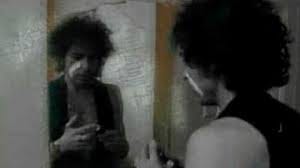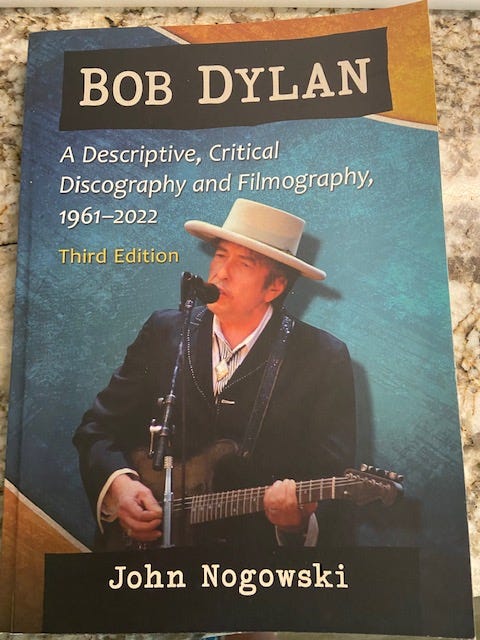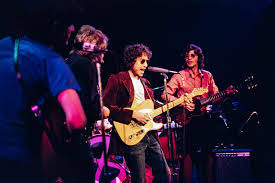Is Bob's best outtake "Series of Dreams"?
Dylan's first career summary was kept off "Oh Mercy." Was this why?
One thing you have to say about Bob Dylan. He seems to know how to get people asking questions about him, his songs and his motives. Having followed him and his music very closely for 50 years or more, even written three books about him (Bob Dylan: A Descriptive Critical Discography - available on Amazon), it’s impossible to tell whether that inexplicable sense of mystery is planned or spontaneous, clever or just plain weird, goofy or magical.
The gathering mystery around his motorcycle accident and his shocking, drying-out, 18-month silence from “Blonde On Blonde” to “John Wesley Harding” did nothing but help his career. I don’t necessarily think it was intentional; he needed a break, health-wise, maybe even creatively. But his absence from the scene created a kind of artistic vacuum that had everybody in the music world wondering, aching, searching for some kind of word from him. Why was he silent? Why wasn’t he still releasing records?


Once that Dylan ache began, it led to the release of “The Basement Tapes” material songs that he was working on, mostly for fun, with The Band up in Woodstock. Somehow, Bob has been able to find ways to be evasive, surprise us, maintaining a sort of momentum from there, releasing albums, outtakes (The Bootleg Series) with somewhat unpredictable regularity. Sounds contradictory but what it means is, Bob will have SOMETHING coming out, just be patient.
Sure enough, just about every soundboard recording of his return to the stage in 1974 with The Band will be out by September. I got to see that tour at the Boston Garden, have an echoey bootleg of the show I saw. In September, I can hear the real thing as part of a staggering 27 CD set of those remarkable shows. Why not wait 50 years to release it, what the hell?
Whether or not those live performances are revelatory, we’ll have to see. But in the meantime, I wonder if one of the first times Bob seemed to be looking back at what he’d achieved was the reason the fabulous “Series Of Dreams” didn’t make the cut for “Oh Mercy.” Sure, “Blind Willie McTell” takes the top spot for outtakes, agreed. But this one, was it too personal?


There were those who were critical of Dylan on the 1974 for looking back, playing his greatest hits. Seemed stupid to me - that’s what everybody wanted to hear. And he’d really never do that again. But the criticism was that by doing these old songs, Dylan was looking back instead of ahead, taking a bow, so to speak.
The first time I heard “Series Of Dreams”, some time late in March of 1991, my initial reaction, like thousands - if not millions - of other Bob Dylan fans, was WHY DID HE LEAVE THIS OFF THE ALBUM? What in the world is he thinking? And, more importantly, was this the first recorded time he was actually looking back at his career with pride and a sense of accomplishment? Did that make him second-guess?
A surging, powerful track that seemed to catch Dylan at the top of his game, “Oh Mercy” producer Daniel Lanois wanted the tune to open the album. The song was good enough to be included on “Bob Dylan’s Greatest Hits, Vol. III” yet Dylan kept it off the “Oh Mercy” album. Here was yet another in a continuing series of whacky Bob Dylan decisions that often confound his listeners and producers alike.
Recorded on March 23, 1989, a few weeks before the album wrapped in April, “Oh Mercy”was released in September to much acclaim, billed as Dylan’s great “comeback” album. Yet he left off its greatest song.
Later, the only other “Oh Mercy” track selected for the Greatest Hits package was “Ring Them Bells” a song that was not only weak grammatically but just a so-so selection for the disk if you ask me. (There were much better songs off that record available.)
Bob did discuss “Series” in “Chronicles, Vol. 1” explaining things in typical Dylanesque manner: "Although Lanois liked the song, he liked the bridge better, wanted the whole song to be like that. I knew what he meant, but it just couldn't be done. Though I thought about it for a second, thinking that I could probably start with the bridge as the main part and use the main part as the bridge...the idea didn't amount to much and thinking about the song this way wasn't healthy. I felt like it was fine the way it was – didn't want to lose myself in thinking too much about changing it."
“Thinking about the song this way wasn’t healthy”? Come again?
It’s possible that just about every other Dylan fan has his or her own interpretation of the song. I admit that mine is somewhat shaped by the wonderful accompanying video (nominated for a Grammy for Best Music Video - lost to R.E.M.’s “Losing My Religion.”) Who knows if Bob had anything to do with it? Or if he’d admit it if he did.
But I think Bob wrote this amazingly introspective song, realized what he’d done and felt it too revealing, too intimate to share with the release of this “comeback” album. In that context, the song would have received much closer scrutiny, Dylan might have been asked a lot about the elements of the song, how it fit with the other songs on the record and so on, what he thought about what he’d achieved in his career thus far.
As I hear it now and as I heard it then, “Series Of Dreams” was exactly that - a career summation, a descriptive, metaphor-laden vision of all the elements of Dylan’s writing career, presented in a way he’s never quite done before. Coming at this particular moment in his career, his 26th album, his strongest work in a long time, it seemed an appropriate time to look back at where he’d been.
The surging, churning music gives the lyric an urgency and his deadpan delivery provides a rich irony to the intensity of his words. As I hear the opening, he’s soft-pedaling the whole thing. “Was thinking of a series of dreams.” Like no big deal. Just some dreams that got him thinking. Dreams that weren’t easy to analyze (“nothing comes up to the top…comes to a permanent stop”) but at the same time, dreams he couldn’t ignore, dreams that were worth writing about.
So he continues thinking about them, dreams where he says the time and tempo drag, “there’s no exit in any direction” - EXCEPT for ones “you can’t see with your eyes.” In other words, you have to see the big picture, look past all this to a higher purpose, like maybe, being a SONGWRITER? For Bob, this is serious business.
Then, modestly, he tries to low-ball his reasons for writing the song. He says he’s not making any great connection or falling for a scheme, he’s just thinking about the dreams. In other words, he CAN’T LET THEM GO.
And now, he describes them for us. Dreams where you have to let them wash over you (umbrellas are “forbade” as I hear it), you’re thrown into the path (of life) and you can’t play your cards and get out of the game. You have to just let it happen. You might see his life as an artist might, letting the canvas and picture come to him, rather than him going out and seeking it, if that makes sense.
He tells us about the dreams themselves, all four of them. In one, “the surface was frozen.” Like New York City when he arrived all those years ago, the musical scene was frozen, stuck with folk singers singing someone else’s song. Dylan broke that ice, his words thawed it out, made the world come alive.
The Richard Gere moment, sticking up for the town of Riddle in the film “I’m Not There”
In another, he witnesses a crime. You could say “Hattie Carroll” or “Hurricane” or to me, it makes me think of that scene in “I’m Not There” where Richard Gere, as the latter-period Bob, walks into a Basement Tape-like setting in this town where some shenanigans are going down and Bob suddenly feels like he has to be the one to challenge it, to defend the town. As an artist, he sees his JOB is to talk about the world around him, honestly. And it doesn’t have to be identified as a protest song, particularly but as he says in “No Direction Home” - “all I do is protest.”
In the next dream, he was running. Self-explanatory. The endless tours, the pressure to surpass what he’d previously done. Never being able to stop. Never wanting to stop.
And finally, “all I seemed to be doing was climb.” Just the way he sings it, it’s as if he was stuck on an escalator, constantly going up and up and up, striving to write better, deeper, sharper, more probing songs, going as deep into his art as he can.
Then, he wraps things up. He did all this by himself. He wasn’t looking ‘for any special assistance.” He wasn’t going to go “to any great extremes.” Which, of course, he did. No 83-year-old tours incessantly and has for years and years. If that isn’t extreme, what is?
Then he drops the killer line - “I’d already gone the distance” - like a proud fighter still on his feet at the end of 15 rounds, having survived, persevered, carried on all these years. He’d “gone the distance” just thinking of his series of dreams, reflecting on all he’d done, all that he’d achieved, all that happened on his watch. And he was right.
“Bob Dylan: A Descriptive, Critical Discography: 1961-2022, 3rd edition” is available on Amazon.





Yes, those were great shows !
I saw the NYC show way back when, and The Band did a set to open up for Bob. Not to include even one of these sets? It must have been an estate copyright issue.